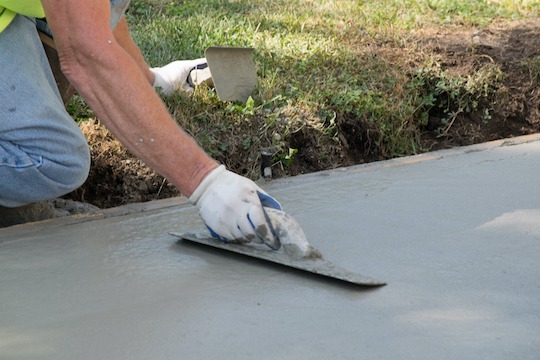Hiring a licensed asphalt pavement contractor to build your new driveway protects you, the customer, from damage liability. Insurance generally goes with that – a sign of quality work overall.
When a homeowner has reached the point of decision on a new driveway – OK, it’s time to hire an asphalt paving company! – the next step is to hire the right driveway contractor.
So what should you, the homeowner, look for in a pavement contractor? Reviews by past customers matter, of course. Price does too – but the lowest price might mean bigger expenses later, as we explain below. Still, there is one category of objective criteria that really matters: it is licensing and insurance.
Those two go together because in most jurisdictions licensing requires insurance. And insurance policies are only made with reputable, licensed contractors. These are useful in a business where scam artists are widespread.
The types of scams that are a sure sign of shoddy work include the “we have a truckload of extra asphalt from a local job and it looks like you could use a new driveway” pitch. It’s remarkably common, and the work generally involves laying a thin layer of asphalt over an existing driveway. That’s with no surface prep, no underlayment of gravel, no written contracts – and a lot of regret when the driveway fails to hold together mere weeks later. After a heavy rain, it could well be the case it was also improperly graded, lacking a crown at the center that allows rain to roll off to the sides. Instead, puddles will form that will ultimately lead to subsurface erosion, which eventually leads to potholes.
Further, if the contractor has an accident on your job that causes property damage, only the one with insurance will be able to compensate you for your losses.
A licensed and insured pavement contractor has higher standards to uphold. With proper training, the right equipment, and the scrutiny of insurance companies and licensing authorities, a better driveway is the welcome result.
Looking at it from a different angle, the lower price might be possible for a contractor who cuts corners. That can include not carrying proper insurance, which might also go along with hiring less-than-trained workers, skimping on materials, and completing the job in less time than quality work would require. With lower quality work comes poor results in pavement; breaks and cracks, potholes, slippage (for example, when asphalt is laid down over older pavement without use of a tack coat), dips and depressions (some call them “bird baths”), heaving (often due to moisture underneath that expands with freezing), and raveling, which often results from laying pavement in lower-than-optimal temperatures.
The mistakes that cut-price pavement contractors make almost always add up to poor asphalt or concrete driveways that need a replacement in just a few years, far short of the decade or longer one might expect from a qualified, insured and licensed pavement contractor.


